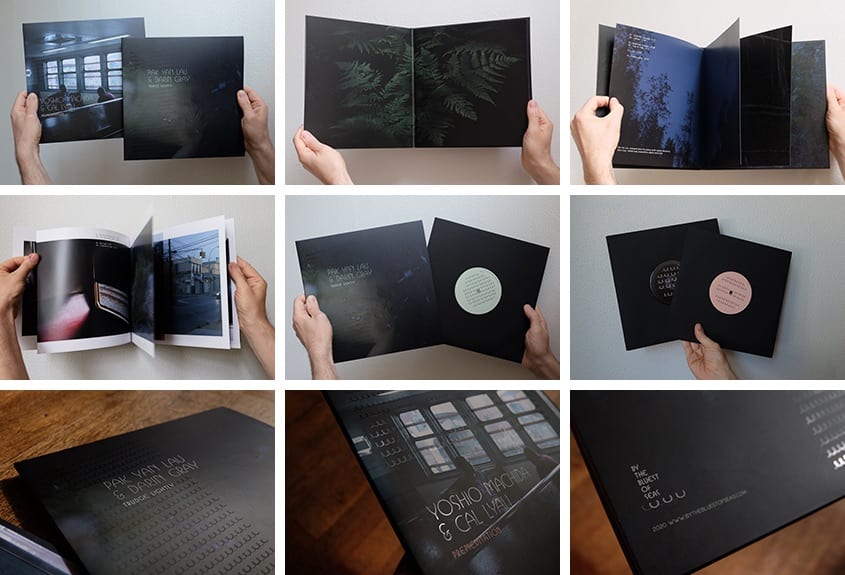
Yoshio Machida & Cal Lyall – Premeditation
By the Bluest of Seas – Out Now
Premeditation is a surprising name for an album of improvised music, but Cal Lyall’s explanation, that it is to do with a moment of deep focus before a performance, makes perfect sense.
Lyall, who hails from Montreal, met his co-performer for the album, Yoshi Machida, at SuperDeluxe in Tokyo, an early 2000s meeting point for the city’s many experimental musicians.
He probably also saw the cello player Yasumune Morishige – the inspiration for the album’s name – play at the venue.
“Before he plays, he takes this really focused moment,” Lyall says of him. “I’ve often thought about improvisation as a sort of meditation, and Morishige’s ‘preparation’, if you will, as a premeditation. When Yoshio and I were recording at his house, I found myself starting to explore this moment before a take.”
The album – a collection of improvised interplays between Lyall on the 5-string banjo and Machida on steelpans, gamelan and metal slit drums – is indeed an act of focusing, of zoning into a meditative state of consciousness.
To listen to it is to be slowly arrested into a gradual force of concentration, the music capturing your thoughts within its interior expanses. The improvised nature of the music, the looseness of its structures but deliberateness of its flow, heightens its meditative quality, giving it a thought-like presence, running away from you but ever-present.
Unlike the seminal and comparable Laraaji LP, Ambient 3: Day of Radiance, it does not rely on repeated resonances and melodies; it relies instead on its inexactness. Ironically, although the mood of the album stems from a moment of focus in a premeditative state, the album is formed by its ‘of-the-moment’ imperfections.
Opening tracks ‘The Fall of The Carolinas’ and ‘The Little Match-Seller’ both centre around the idling away of Lyall’s out-of-tune banjo, which plays out a mournful yet imprecise set of hooks that never quite emanate into a melody – in a way not too dissimilar to the free improvisation of guitarist Bill Orcutt. In their minor key dissonance, they carry an agitated mood that is slowly soothed by Machida’s steelpans.
Within the interplay, Machida’s steelpans and gamelans play the role of grounding Lyall’s banjo and by the time of the fourth track, ‘Langhorne’s Wake’, the pair are in a settled and focussed state. Lyall’s playing is now calm, more in tune, coalescing around Machida’s peaceful resonances, and the piece now takes on a joyful reminiscence.
Lyall says the song is named in honour of the Greenwich Village banjo player Bruce Langhorne – who the Dylan song ‘Mr Tambourine Man’ is supposedly about.
“There is a studied simplicity to what he does, and the banjo playing is far from technical, but just so perfect,” he said. “He passed away just before we completed recording this album, so yes – there’s a bit a tribute in there.”
‘Langhorne’s Wake’ – the album’s most emotional track – certainly has a simplistic harmony to it that owes more to folk than the more overtly experimental openers, something Lyall alludes to.
“I think the big change for me was to allow a certain melodicism to creep in,” he says. “I think that previously I was taking the role of saboteur a bit more seriously, and it was a kind of language for me. With a deeper listening of a range of music – particularly folk music – through the years, I’ve started to rediscover patterns that I like, and found them just naturally appearing in this duo.”
The track is the album’s emotional zenith before the two closing tracks, ‘Yukon’s Progress’ and the titular track ‘Premeditation’, see both players intensify and home in on a far greater state of focus and an almost psychedelic transcendence. The tracks see both players making the most of their instruments, Lyall’s finger picking becoming more adventurous and Machida’s percussion reaching a crescendo. The mix as well gets more immersive, the resonance of Machida’s steelpans circling around the listener’s head.
The peculiar thing is that the terrain of the music – the sounds and melodies of the two instruments – do not on the surface listen vary that much, and yet the listener feels as though they have travelled an expanse within it. Much like meditation, where focusing on the process of mind itself can reveal greater depths than the most extravagant thoughts, the album explores the absolute depths of the instruments and modes of music Lyall and Machida are operating in. As the playing fades out into the lingering resonances of Machida’s steelpans, you are left with a warm sense of calm. Transformed from the agitation of Lyall’s banjo on the opening tracks, you finish with a feeling of great focus, ready, like the celloist Morishige, for your own performance.

The release forms part of a new series of 10″ records on By the Bluest of Seas proposing a dialogue between sound (improvised music, soundscapes, etc.) and image (a series of pictures by Brussels based photographer Beata Szparagowska and inspired by the musical universe of each record).
More details here: https://bythebluestofseas.com/

